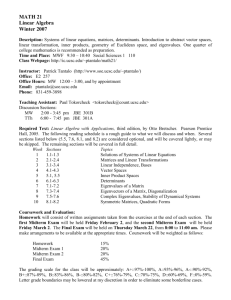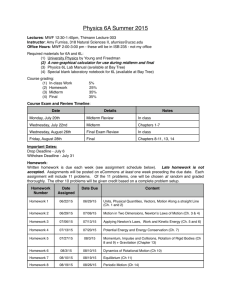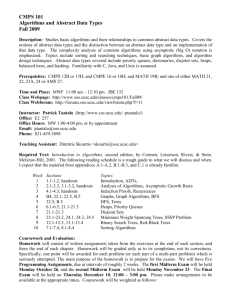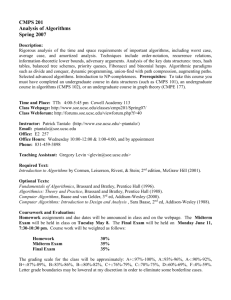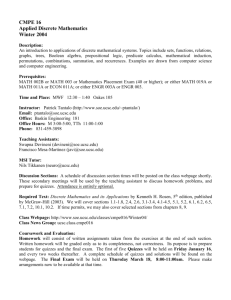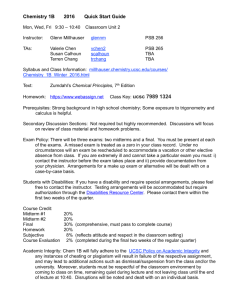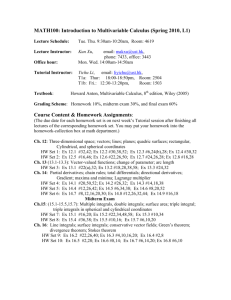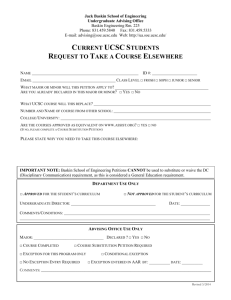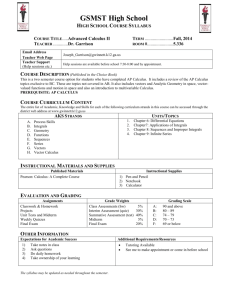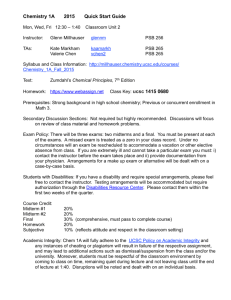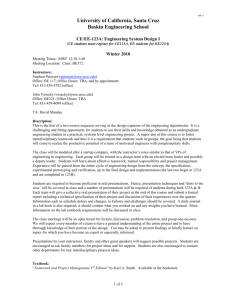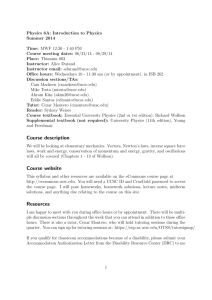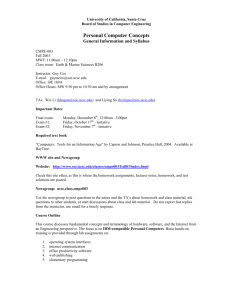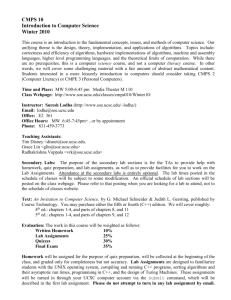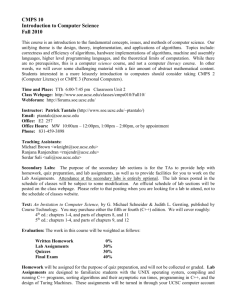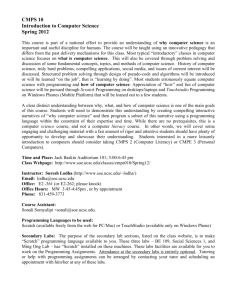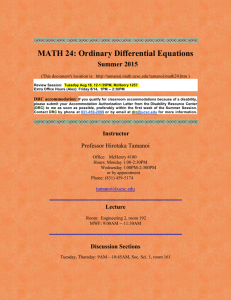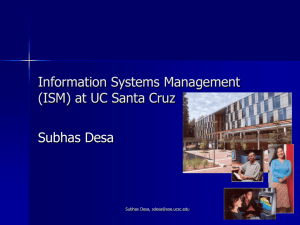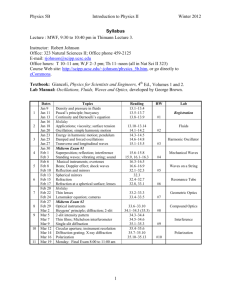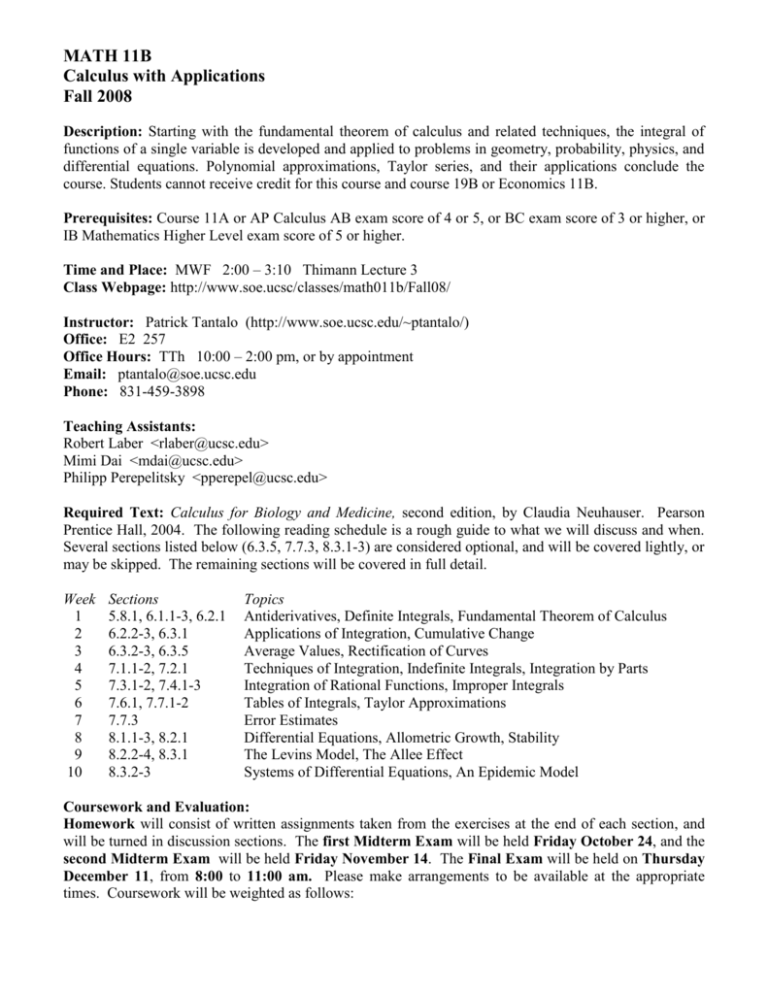
MATH 11B
Calculus with Applications
Fall 2008
Description: Starting with the fundamental theorem of calculus and related techniques, the integral of
functions of a single variable is developed and applied to problems in geometry, probability, physics, and
differential equations. Polynomial approximations, Taylor series, and their applications conclude the
course. Students cannot receive credit for this course and course 19B or Economics 11B.
Prerequisites: Course 11A or AP Calculus AB exam score of 4 or 5, or BC exam score of 3 or higher, or
IB Mathematics Higher Level exam score of 5 or higher.
Time and Place: MWF 2:00 – 3:10 Thimann Lecture 3
Class Webpage: http://www.soe.ucsc/classes/math011b/Fall08/
Instructor: Patrick Tantalo (http://www.soe.ucsc.edu/~ptantalo/)
Office: E2 257
Office Hours: TTh 10:00 – 2:00 pm, or by appointment
Email: ptantalo@soe.ucsc.edu
Phone: 831-459-3898
Teaching Assistants:
Robert Laber <rlaber@ucsc.edu>
Mimi Dai <mdai@ucsc.edu>
Philipp Perepelitsky <pperepel@ucsc.edu>
Required Text: Calculus for Biology and Medicine, second edition, by Claudia Neuhauser. Pearson
Prentice Hall, 2004. The following reading schedule is a rough guide to what we will discuss and when.
Several sections listed below (6.3.5, 7.7.3, 8.3.1-3) are considered optional, and will be covered lightly, or
may be skipped. The remaining sections will be covered in full detail.
Week
1
2
3
4
5
6
7
8
9
10
Sections
5.8.1, 6.1.1-3, 6.2.1
6.2.2-3, 6.3.1
6.3.2-3, 6.3.5
7.1.1-2, 7.2.1
7.3.1-2, 7.4.1-3
7.6.1, 7.7.1-2
7.7.3
8.1.1-3, 8.2.1
8.2.2-4, 8.3.1
8.3.2-3
Topics
Antiderivatives, Definite Integrals, Fundamental Theorem of Calculus
Applications of Integration, Cumulative Change
Average Values, Rectification of Curves
Techniques of Integration, Indefinite Integrals, Integration by Parts
Integration of Rational Functions, Improper Integrals
Tables of Integrals, Taylor Approximations
Error Estimates
Differential Equations, Allometric Growth, Stability
The Levins Model, The Allee Effect
Systems of Differential Equations, An Epidemic Model
Coursework and Evaluation:
Homework will consist of written assignments taken from the exercises at the end of each section, and
will be turned in discussion sections. The first Midterm Exam will be held Friday October 24, and the
second Midterm Exam will be held Friday November 14. The Final Exam will be held on Thursday
December 11, from 8:00 to 11:00 am. Please make arrangements to be available at the appropriate
times. Coursework will be weighted as follows:
Homework
Midterm Exam 1
Midterm Exam 2
Final Exam
10%
25%
25%
40%
The grading scale for the class will be approximately: A+::97%-100%, A::93%-96%, A-::90%-92%,
B+::87%-89%, B::83%-86%, B-::80%-82%, C+::76%-79%, C::70%-75%, D::60%-69%, F::0%-59%.
Letter grade boundaries may be lowered at my discretion in order to eliminate some borderline cases.
Academic Honesty:
The Mathematics Department has a zero tolerance policy towards any incident of academic dishonesty.
If cheating occurs, consequences within the context of the course may range from getting zero on a
particular assignment, to failing the course. In addition to these sanctions, every case of academic
dishonesty is referred to the students’ college Provost, who sets in motion an official disciplinary process.
Cheating in any part of the course may lead to failing the course and suspension or dismissal from the
university.
What is cheating? In short, it is presenting someone else’s work as your own. Examples include (but are
not limited to) copying another student's written homework assignment, midterm exam, or final exam,
allowing your own work to be copied, or in any way facilitating the cheating of others. Although you
may discuss problems with fellow students, your collaboration must be at the level of ideas only.
Legitimate collaboration ends when you "lend", "borrow", or "trade" written solutions to problems, or in
any way share in the act of writing your answers. If you do collaborate (legitimately) or receive any form
of help from anyone, you must credit them by placing their name(s) at the beginning of your assignment.
Please go to http://www.ucsc.edu/academics/academic_integrity/ to see the full text of the University's
policy on Academic Integrity.

